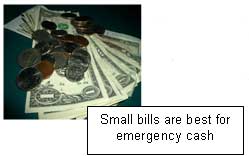Why This is Important

"A worldwide influenza pandemic could have a major effect on the global economy, including travel, trade, tourism, food, consumption and eventually, investment and financial markets." (
Official U.S. Government Pandemic Website).
This means you might be out of a job, perhaps for months. This also means there might not be food in stores, any money in banks, no available health care. There might not be a way for you to get more resources (food, money, etc.) and you will have to live on what you have in your possession at the beginning of the pandemic
Lessons learned
Massive disasters such as Hurricane Katrina highlight the importance of financial preparedness. Like all financial matters, there is no single answer for everyone. Financial experts suggest the following:
- Cash on hand. An extra supply of cash is necessary. During a pandemic, electricity may be out. This means ATM machines and credit card machines may not work, and checks may not be accepted. Cash may be the only payment that businesses are able to accept. Even if electricity is available, the number of sick or dead workers may mean no restocking of ATM machines.

What is a good amount of cash to keep on hand? Some example guidelines:
- about $50 per family or household member
- at least $200
- enough for 1 tank of gas plus one week's worth of food and essential supplies
Small bills are best, in case you cannot get change. A roll or two of quarters is also a good idea. You can build this up by putting your loose change in a jar.
Be careful of theft and security concerns. Consider a fireproof lockbox.
- Build up a savings cushion. Planning for a pandemic entails thinking about long term employment interruption.
"Being able to work may be difficult or impossible. Plan for the possible reduction or loss of income if you are unable to work or your place of employment is closed." Official U.S. Government Pandemic Website
Financial experts advise people even in regular times to try to maintain at least three months of living expenses, to be used if they have an emergency. Have one month of money at home in a fireproof lockbox, and keep the other two months in a savings account. This is a difficult but worthwhile goal. Start small and build as you can. Even having just a month's rent or mortgage payment in a savings account would give you greater security and flexibility.
- Preparation is savings. Food costs have risen dramatically and will likely continue to rise. Food is 'insurance you can eat' and has a place in financial planning. Building your food pantry NOW means that you will not have to pay more to stock up later. Over time, the savings enables you to purchase other necessities.